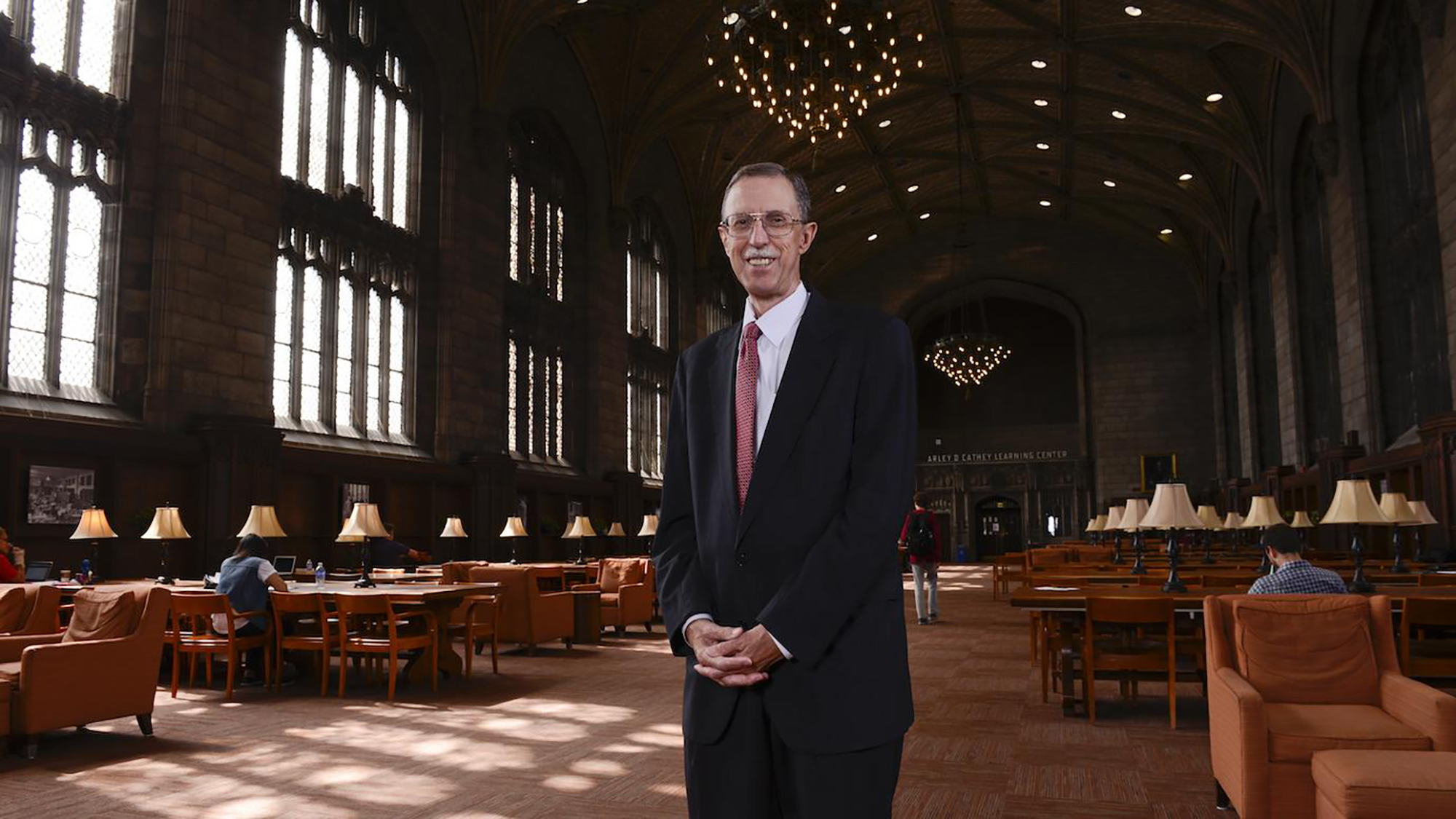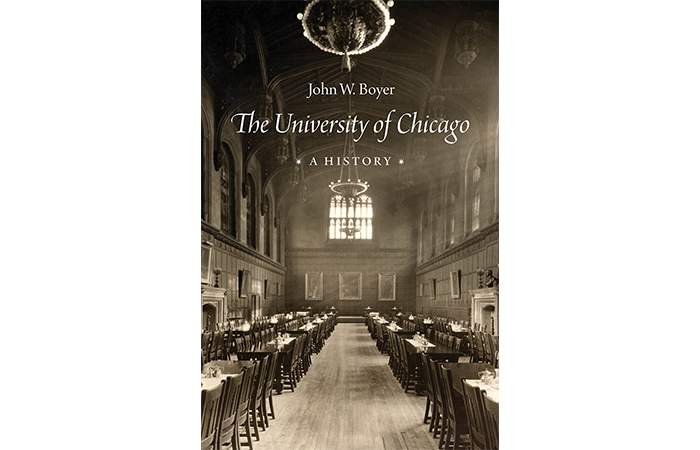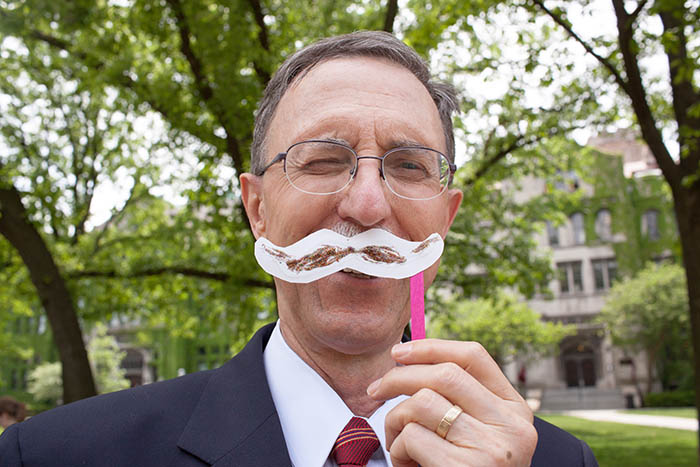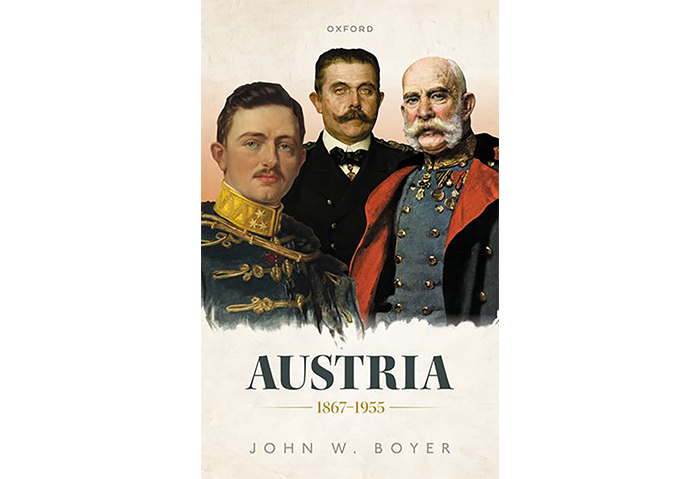
John W. Boyer, AM’69, PhD’75, the Martin A. Ryerson Distinguished Service Professor of History, has served an unprecedented six terms as dean of the College. (Photography by Matt Marton)
Reflections from John W. Boyer, AM’69, PhD’75, on three decades leading the College.
In July John W. Boyer, AM’69, PhD’75, the College’s longest-serving dean, will become senior advisor to UChicago president Paul Alivisatos, AB’81. Boyer’s responsibilities will include advising on the University’s international strategy, global education and fundraising, and the support of programs involving public discourse, academic freedom, and the history of higher education. Boyer will continue to teach in the College.
In a conversation with the Magazine, Boyer discussed his 31-year tenure as dean, his 1,100-page book on the Habsburg Empire, and how it feels to be UChicago famous.
This interview has been edited and condensed.
When you became dean, what was the best advice you received?
Mrs. Gray1 said, “I’m offering you the deanship, but it’s really like a college presidency.” That was an explanation but also a piece of advice. The College deanship is more public facing than a typical deanship, involving a huge amount of work with the community, a lot of fundraising, a focus on student life, and, you could say, public intellectual work. These are not things that academic deans normally do.
Candidly, I’ve been offered other college presidencies over the years, and I’ve said, thank you very much, but I’m already president of a college.
What was the worst advice?
In the 1990s we were engaged in a complicated attempt to reimagine the curriculum—basically to reduce the size of the Common Core to make room for free electives and eventually double majors and minors. The goal was not to degrade or weaken the Core, but it was very controversial.
I started with a series of faculty retreats in 1994 and ’95. The final vote took place in ’98. Five long years. Faculty saying, over my dead body. Well, you’re still alive.
A number of people told me, this is going on for too long. There was pressure to do something. A dean is powerful, but not that powerful. And sometimes one has to go slowly and carefully and deliberately—I’d say cunningly. A lot of people along the way either said it was hopeless or do it right away and be done with it. And both were unwise advice that I didn’t follow.
Robert Hutchins2 used to say, a lot of people can start things; the question is how to make them last. If you do things in a reckless way, it can damage the institution. The irony is that Hutchins was pretty reckless, but there was a side of him that was reflective.
Looking back on the Sturm und Drang of the ’90s, it was great fun, but I wouldn’t want to do it again.
What did alumni think about changing the Core?
After we had announced some of the changes, I was told there were some New York alumni who wanted to meet. I got to the Hilton at eight in the morning. I thought I was going to some small room. It was the ballroom. I walk in and there are 200 people glaring.
Then it began: Dean Boyer, is it true you’re going to ruin the University? Is it true you’re going to destroy the Core? It was like being in a 12-foot hole and I had to climb out of it, using whatever rhetorical skills I had. At the end—well, I was able to leave the room.
I talked about my experiences as a young faculty member joining the Western Civ staff, working with Jock Weintraub, AB’49, AM’52, PhD’57, and Eric Cochrane and Keith Baker.3 These were great teachers, many of whom had won the Quantrell Award.4 I had even met Christian Mackauer,5 who was revered by older alums. I told the alumni I learned much more going to Western Civ staff meetings than I had in graduate school.
So by invoking history—and this was long before I ever started to write the history of the University6—I was able to persuade them that I understood the special quality of the place. Which is somewhat mythic, but universities need myths. They need stories about themselves. This is a place that is replete with a proud self-identity. By invoking my own humble personal history, I was able to reassure people.
What did students think?
In 1999, after we passed the new curriculum, we told current students they could choose to opt in to the new or keep the old. The new curriculum had more electives and a smaller Core, and 96 percent of students opted in. It was like a Roosevelt landslide. We didn’t do it to make the students happy, but it did.
What sacrifices or compromises did you make as dean?
For any dean, department chair, or provost, the days are filled with compromises, and that’s probably a good thing. The to and fro of negotiations sharpens things.
In your 31-year tenure, what accomplishments are you most proud of?
The first decade of my deanship was preoccupied with curricular reforms. Without the changes we made to consolidate the Core, the other changes could not have happened. The vote we took in March 1998 on the new curriculum—which had taken five years of my life—was enormously important. If I had just stopped there, I would feel I had made a contribution.
Once that happened, we wanted to have a large, thriving College—returning to the size of the College in the 1920s and ’30s. There had been a collapse of enrollment, which I wrote about in my book.
The next two decades I devoted to other issues: rebuilding admissions, changing the conditions of housing, creating career services and study abroad programs, establishing the Paris center. This all began in ’98 and ’99. But I couldn’t move on any of these other things when the curriculum reforms were so big.

What were the biggest surprises of your deanship?
I’m not sure it was a surprise—as an historian, I know how difficult it is to engineer and sustain institutional change—but this is a tough place. Larry Kimpton7 once said, all kinds of people have tried to monkey around with this place, and it’s defeated all of them. In fact, it didn’t happen to Kimpton. He effected a lot of change.
What have you enjoyed the most?
The opportunity to meet different kinds of people. It’s like being mayor of a small town. You get up in the morning, you don’t quite know what’s going to happen, but something’s going to happen. It’s a series of Henry Jamesian moments. The vast panorama of human nature unfolding.
Do you keep a journal about all this?
No. I just published a big book,8 and I used many different diaries, for which I’m very grateful. But diaries are complicated. They purport to be an accurate record of the events of the individual writing the diary, but often they are not. They can also be rewritten later. Diaries are like autobiographies—complicated literary documents. So I never wanted to do that.
When you were growing up, did you ever imagine you would become a dean?
I don’t think anybody—my gosh, I hope not—is born to become a university administrator.
It started because Mrs. Gray asked me to become collegiate master of the Social Sciences Division after I had been involved with some administrative work in the history department. I guess I didn’t screw that up too badly, because she asked me to be dean.
How did you get interested in history?
That’s a wonderful question. How does anybody become what they grow up to be?
In the grocery store there used to be encyclopedias you could buy, one volume at a time, for 50 cents. My mother would buy them, and I would read them—open up “A” and start reading about anthropology or ants or aggression.
This is not Diderot and the Encyclopédie—but it is. It’s a way of entering into the world of the Enlightenment, understanding humanity through the accomplishments of previous generations. The great books for working-class people, next to the frozen foods and the potato chips.
I grew up in the old Pullman neighborhood,9 where George Pullman had created a public library—now part of the Chicago Public Library. It was a wonderful building that looked and smelled and felt like a 19th-century library. I remember going there as a kid and just wanting to stay.
What are your thoughts on liberal arts education, at a time when its value is being called into question?
I understand that students—and especially parents—are worried about career outcomes. Those pressures are real. A degree in economics or computer science does lead to very happy outcomes, defined in material terms. Whether it leads to happiness in general is a different question.
Because so much of the Core is humanistically oriented, we have not had to sacrifice a commitment to the humanities. We have reaffirmed it. And again, because of the reforms, we opened up space for minors and double majors. Students might major in computer science, but they can minor in German or art history.
Universities must resist the pressure to professionalize and vocationalize their curricula—falling prey to the winds of public culture. And they must protect themselves against political pressures, such as the notion that people who are studying certain subjects are a threat.
The adverse winds are strong against knowledge for its own sake. But the nation needs people who can think for themselves, and who understand that knowledge for its own sake is also knowledge for the sake of others.
I remain a guarded optimist. Certainly UChicago and other universities in our peer group are determined to defend the liberal arts, come what may.
How does it feel to have finished the Habsburg book?
My editor at Oxford would very patiently, every few years, write me an email: “John, how’s the book coming?” I agreed to do it in 1989 or ’90. But I was sidelined by my monographs and my book on University history.
I got into Austrian history because I originally wanted to do American history. If you’re going to do European history, the closest thing to America is the world of the Habsburgs: this multinational, multireligious, multiethnic, multiracial empire.
There are also parallels between what the Habsburg leaders were trying to do and what UChicago leaders were trying to do. In some ways, my two books share a logic: How do you sustain a complex institution with deep, self-regarding values and identities?
Here’s some advice for Magazine readers: If you ever have the idea of writing two books at once, forget it. Give it up.
How did you keep the enormous amount of material in your histories straight in your mind?
I tell my students, when you’re writing a book, you’re like a sculptor working with clay. You start with a huge pile of clay on the table and take stuff away.
As the author of a 700-page book10 and a 1,100-page book,11 you could say, that’s someone who didn’t follow his own advice. Both of those books could have been twice as long, though.
Do you have a set writing practice?
I come into my own late at night. I’m a 9 p.m. to 2 a.m. person. When I’m totally exhausted and can’t think anymore, it’s time to sleep.
What’s your next 1,000-page book?
First I’ll be revising the University of Chicago history to take it through the Robert J. Zimmer12 administration.
I also have a contract with Princeton University Press to write a book on religion and politics in modern Europe from the French Revolution to the present that will take in Britain, France, Italy, Germany, and Austria-Hungary.
You’re a familiar figure on campus and in Hyde Park. How did you become UChicago famous?
When I started as dean, I didn’t know anything about housing. So I began to visit the dorms. I think the students wondered, who is this guy asking about the food, or why the elevators in the Shoreland 13 don’t work, or why there’s this particular odor in Broadview14 that never goes away? And then I was also the guy who rides a bike everywhere, like something out of a 1930s British novel.

You are very tolerant of student culture. When you were flash mobbed, you danced along. You posed with a paper mustache on Dean Boyer Appreciation Day.
This comes back to the Habsburgs. The world of the Habsburgs was a world of pronounced, intense visuality. When I was elected to the Academy of Sciences in Vienna some years ago, there was a great ceremony with flowers, a Mozart quartet, speeches in a baroque hall. A friend had been elected to one of the German academies, and he said, in Germany, they send you a letter.
I’ve always thought that the Austrian way of visual culture, theatrical culture, serves the University well. University leaders should be public figures. It softens the boundaries and creates a unified culture.
Sometimes it seems like you have 7,000 grandchildren.
It’s better to have 7,000 grandchildren than 7,000 children. It’s a nice analogy, because I’m not their parent. I’ve never viewed the College as being in loco parentis. A grandparent doesn’t offer strangulating control, but genial and sympathetic support.
Notes
- Hanna Holborn Gray, the Harry Pratt Judson Distinguished Service Professor Emeritus of History, was the first and so far the only woman to serve as president of the University (1978–93). Her preferred form of address as president was Mrs. Gray.
- Robert Maynard Hutchins served as president (1929–45) and later chancellor of the University (1945–51). He established the New Plan, which admitted students without a high school diploma, and popularized the study of the great books.
- Karl Joachim “Jock” Weintraub, Eric Cochrane, and Keith Baker, legendary history professors.
- The Llewellyn John and Harriet Manchester Quantrell Award for Excellence in Undergraduate Teaching, given annually since 1938.
- Christian Mackauer, one of the architects of the Western Civilization sequence.
- The University of Chicago: A History (University of Chicago Press, 2015).
- Lawrence Kimpton, president of the University (1951–60).
- Austria 1867–1955 (Oxford University Press, 2022).
- A neighborhood on the far South Side of Chicago, founded as a company town by George Pullman, who designed and manufactured the Pullman sleeping car.
- The University of Chicago: A History.
- Austria 1867–1955.
- Robert J. Zimmer, president of the University (2006–21) and chancellor of the University (2021–22).
- Shoreland Hall, 5454 South Shore Drive, built as the Shoreland Hotel in 1926, was converted into a residence hall in 1976; President Paul Alivisatos lived there as an undergrad. It closed in 2009.
- Broadview Hall, 5540 South Hyde Park Boulevard, was another converted hotel. It closed in 2016.

